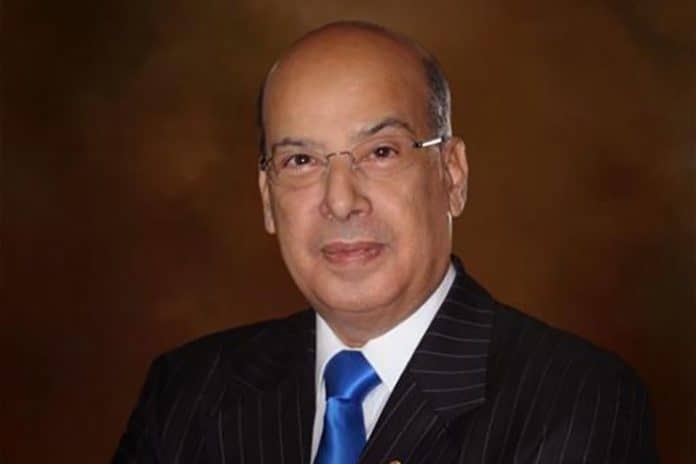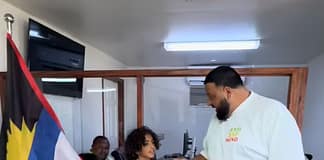
By Sir Ronald Sanders
(The writer is Antigua and Barbuda’s Ambassador to the United States and the Organization of American States. He is also a Senior Fellow at the Institute of Commonwealth Studies at the University of London and Massey College in the University of Toronto. The views expressed are entirely his own)
Strong disagreement may be brewing at the Organization of American States (OAS) on how to respond to the ongoing, grave political and constitutional crisis in Haiti.
Since January 2020, the Haitian President, Jovenel Moïse, has been ruling the country by decree without any legislative oversight. The mandates of the members of the Haitian Parliament, except for 10 of them, were terminated because elections were not held.
The rising tension in the country, including use of lethal force by the police against protestors, widespread kidnappings and killing, rape of women, and an arbitrary decision by Moïse to hold a controversial referendum on a new constitution, as well as heightened political contention, caused concerned member states at the OAS, including nine CARICOM countries, to sponsor a Resolution at the organization’s Permanent Council to address the situation urgently.
Specifically, the Resolution, adopted on March 17, offered “the good offices of the OAS under the authority of the Permanent Council to facilitate a dialogue that would lead to free and fair elections”. It requested the Secretary-General, Luis Almagro, “to advise the Government and other major stakeholders in Haiti, of the Permanent Council’s offer to undertake a good offices role and to invite the President of Haiti to consider inviting the Permanent Council to do so”.
Whether or not Almagro wrote to the Haitian President and “other major stakeholders” is unclear. Certainly, no major political party or human rights group in Haiti has confirmed receipt of any communication from him. There has also been silence from him to two official requests, asking for details of stakeholders to whom he might have written and when. There is no need for this – a straight answer is all that is required.
This matter will be mired in controversy, because while uncertainty prevails over whether or not the Secretary-General did write to the President and other major stakeholders in Haiti, a letter dated April 28 was sent to him by Claude Joseph in the latter’s capacity as Minister of Foreign Affairs. The letter is significant.
First, it does not refer to any communication received from Almagro. Instead, it references the Permanent Council’s Resolution of March 17 as the basis for writing. Second, it states that “the Government of the Republic of Haiti is willing to receive an OAS mission in support of the ongoing dialogue with all the nation’s stakeholders with a view to concluding a political agreement that will facilitate the organization of the constitutional referendum and elections at all levels during the course of 2021”.
On the second point, the OAS Resolution of 17 March did not offer its good offices “to facilitate the organization of the constitutional referendum”. The proposed referendum is entirely of President Moïse’s making and is mired in claims of unconstitutionality. The highly respected U.S. Congresswoman, Maxine Waters, describes it as “Moïse’s most audacious and dangerous power grab”. Legal experts inside and outside Haiti have opined that the existing Constitution specifically prohibits referenda to decide constitutional changes because a former dictator, Jean Claude ‘Baby Doc’ Duvalier, had used that artifice to proclaim himself President-for-Life. Therefore, if the OAS accepts that facilitation of the referendum is a condition of its good offices’ role, its purpose and credibility are undermined even before it starts. No stakeholder would participate in any dialogue where organisation of a constitutional referendum is a condition.
It is important to recall that, prompted by the rapidly deteriorating democratic and human rights situation in Haiti, the offer of good offices by the Permanent Council resolution was “to facilitate a dialogue that would lead to free and fair elections”. Nowhere did the Resolution venture to suggest that the OAS’ role would include facilitating the organisation of a referendum to alter the constitution.
Particularly significant is that on April 26, two days before Joseph sent his letter to Almagro, 68 members of the U.S. Congress wrote to Secretary of State, Antony Blinken, pointing out that Moïse “lacks the credibility and legitimacy to oversee a constitutional referendum scheduled for June 2021, or to administer elections that are free and fair”.
This position by such a large number of U.S. Congress persons, led by Gregory W. Meeks, the Chair of the Foreign Affairs Committee of the House, is a remarkable development. It shows that important U.S. lawmakers are deeply concerned about what they describe as, “lack of preparedness of electoral institutions to hold elections, as well as the unconstitutional composition of the prevailing electoral council”. Contrary to law, Moïse handpicked the members of the Council.
Of especial note is that the 68 U.S. Congresspersons urged Secretary Blinken to use the U.S. vote within the OAS “to ensure U.S. taxpayer dollars are not spent in support of this referendum”.
Last year, the OAS and CARICOM, held all the parties in Guyana to account to deliver a credible result to general elections held on March 2. It took five months of the active attention and diligence of CARICOM, the Commonwealth, the European Union and the OAS to ensure that democracy and the rule of law were upheld in Guyana, and that general and regional elections were not stolen by the incumbent government.
What is happening in Haiti now is no less egregious than what was resisted in Guyana in 2020 and is now being condemned in other member states of the OAS – and even in countries outside of it.
The OAS must act in the interest of Haiti and the Haitian people to uphold their rights to democratic governance, human rights, and the opportunity for economic development. The governing Charters of the OAS mandate it.
Responses and previous commentaries: www.sirronaldsanders.com
Advertise with the mоѕt vіѕіtеd nеwѕ ѕіtе іn Antigua!
We offer fully customizable and flexible digital marketing packages.
Contact us at [email protected]

















Does the Ambassador see any correlation between the massive reduction / withdrawal of the UN Peacekeeping Unit and the ever increasing terror, violence (to schoolchildren as well as adults), instability, collapsing banking mechanisms, rabid corruption at all levels in society and rapidly descending poverty within Haiti?
The blue helmets were not perfect, far from it, but many working Haitians felt at least the appearance of some security.
Moise is a Duvaliste… Diplomats would be mad to presume he will not behave in the style of papa & baby doc… In December Moise formed a ‘secret service’ answerable only to him, that carry out daily atrocities that anywhere else in Caricom would bring down the person & party.
President Sweet Micky Martelly, (friend of Clinton & kompa singer) hired men who’d worked for Duvalier to his cabinet.
Plus ca change with talk talk & more talk.
In the Western Hemisphere, Haiti was the first free black nation and following France’s demand for hundreds of millions of francs to be ‘allowed’ Independence, no matter the Haitians won the wars they fought, the poorest.
That needs to change – and talk won’t do it.
The UN & other agencies I suggest, needs to switch from doling out ‘begging bowl’ aid, to deep financial partnership investment, reparations on a scale undreamt of, and solid long-term partnership building of a new system of governance that can include 13+million Haitians living in fear of their lives in Haiti.
A good begining would be allowing Haitians to travel as Caricom citizens, (not second tier, subjugated wannabes) and to set up the Caricom Skills Certificate program there, so permitting some Haitians to create meaningful lives for themselves in our region, while being able to support family at home.
We West Indians would benefit from their full participation.
Haiti is complex, multilayered and challenging; bundling its people together as undesirables from a ‘shithole country’ compounds the insecurity, hate & corruption.
Everyone from outside occasionally looking in, needs to carefully check themselves and their emotional, financial & power motives THEN the
to-be decades long creation of a strong fair nation might, just might, stand a chance.
Important one word correction in my last post:
The UN & other agencies I suggest, need to switch from doling out ‘begging bowl’ aid, to deep financial partnership investment, reparations on a scale undreamt of, and solid long-term partnership building of a new system of governance that can include 13+million Haitians CURRENTLY living in fear of their lives in Haiti.
O-ASS is a complete waste of time!
Comments are closed.